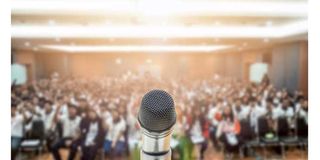Radio Voice Bank, an innovation empowering communities

Microphone. Despite the social media taking lead when it comes to content and access to formation, radio still remains the most important and trusted information medium in Africa.
What you need to know:
- In Kenya, before the digital migration, radio had the highest proportion of audience.
- Radio is still the most consumed media source in the country.
Despite social media taking the lead when it comes to content and access to formation, radio remains the most important and trusted information medium in Africa.
In Kenya, before the digital migration, radio had the highest proportion of audience. A report on Kenya Media landscape indicates that despite the fact that the audience for radio has declined gradually from 92 per cent in 2017 to 66 per cent in 2019, radio is still the most consumed media source in the country.
This is because radio reaches people in rural areas where a large percentage of the population is illiterate or semi-literate and uses a language they understand. It also transcends geography and social status and doesn’t require airtime or incur data charges. And builds on Africa’s rich traditions of oral storytelling.
However, on many occasions, content that is important to rural communities that can be used for training, health, general education, farming, gender-based violence, and general development is not saved or shared.
Also read: Africa to harness tech for women empowerment
This is because there is no central platform that allows content creators such as communications NGOs, local language radio programmes, news and media outlets to publish media and make it relatively easy for users to search and use such content for referencing.
Radio Voice Bank innovation would have this as a thing of the past. As the world’s first open-source searchable library platform of curated informational and educational audio content aimed at African audiences, the Radio Voice Bank will provide content that will educate, inform and inspire “last mile” listeners. Think of it as a “dedicated podcast channel” or an “audio Google or YouTube” for Africa
At present, most rural women, especially in marginalised areas like North-Eastern, have little to no opportunity to learn anything new. The Radio Voice Bank platform will enable women to have unprecedented learning opportunities and be able to make informed choices and decisions instead of guessing. For the first time a world of knowledge will open up for local language speakers.
Radio Voice Bank is providing a platform where content providers and topic experts can distribute or make available relevant, meaningful and useful content and share them with others. Communities can also create content and share their local knowledge. Content can be made available in the source language, or as translated into a range of local or more widely spoken languages, such as Kiswahili and local languages.
Using a podcast platform approach, it is designed for use in low bandwidth environments and also for sharing the content freely via app, which can be downloaded in MP3 format on phone and use radio listening group as a forum for dissemination.
Already, the Horn of Africa Development Initiative (Hodi), an organisation that has emerged as one of the critical voices championing peace and development in Marsabit through advocacy, education, community cohesion (through football) and livelihood support programmes, is partnering with Lifeline Energy to produce a smart radio chip that is attached to existing solar radios for the recording of narratives, which are uploaded into a shared repository.
Since access to and use of information for developmental decision-making is intrinsically connected to improved outcomes, Hodi initiated community dialogue groups, currently operating in 155 villages. In these Mala-Marii groups, elders, women and the youth meet to discuss issues affecting them in their villages and exchange best practice on how to address these challenges or leverage opportunities. The engagement further provides an opportunity to share news, as this region hardly receives positive media coverage or news from other parts of the country.
The application aims to create interactive and immersive platforms that bridge the gap between the storyteller and their audience. For example, a four-gig smart radio chip can store 60 hours of radio content on issues such as agriculture, health, livestock, and water that the women can retrieve to empower themselves or eight gigs that can store 120 hours of information.
This information can be uploaded onto smartphones and where women can easily access it and use it to amplify their voices on issues that affect them and further engage downstream with other women through the village structure so that no woman is left behind.
Imagine a Lifeplayer that will talk in Borana, Rendile, Burji and Samburu and educate the women on different topical issues of relevance to them. The region will then transition from one of “Never Ending Problems” to “Never Ending Possibilities.”
Rosemary Okello-Orlale is the director of Africa Media Hub; Kristine Pearson is the founder of Radio Voice Bank




